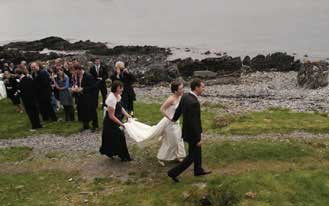 古老的蘇格蘭婚禮習(xí)俗 [ 2007-10-17 17:18 ]
蘇格蘭人的婚禮習(xí)俗隨著歷史的變遷也經(jīng)歷了諸多變革�����。在現(xiàn)代蘇格蘭人的婚禮中����,我們?nèi)匀荒芸吹揭恍﹤鹘y(tǒng)習(xí)俗的痕跡,但是有一些已經(jīng)不復(fù)存在多年的傳統(tǒng)習(xí)俗是更有趣的�。

Scottish wedding customs have changed dramatically over the years. Some parts of weddings seem steeped in tradition whilst you will be glad to hear of some customs which have died out over the years! On Barra, it was traditional to sprinkle water on the marriage bed and bless it. In Mull, it was customary that the young couple sleep in a barn for their first night and in Lewis they lived for a week with the bride's parents before going to their own home.
Celtic practices were part of ceremonies for many hundreds of years and had roots in pagan rituals. Tying the knot originated from the bride and groom ripping their wedding plaids (clan tartans) and tying the two strips together as a symbol of the unity of the two families. According to Gaelic tradition it is unlucky to marry in the month of May or during a waning moon. In Aberdeenshire even now the 'blackening' is a ritual performed with great relish. The engaged couple are captured one night by so called 'friends' and covered with foul substances such as treacle, feathers, soot etc and then paraded around the village and usually the pubs. It takes days to wash clean!
Tradition says sew a hair onto the hem of a wedding dress for luck, or let a drop of blood fall onto an inner seam. The bride must never try on a complicated dress in advance of her wedding day. To facilitate this tradition a small section of the hem is left unsewn by the dressmaker until the last moment. The bride, when she leaves home for the last time as a single girl, should step out of the house with her right foot for luck.
(British Council)
|